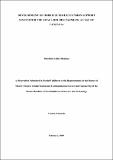Development of horticulture extension support system for the small holder farmers: A case of Tanzania
Abstract
Horticulture as part of agricultural sector plays the role for food security, economic growth and
nutrition improvement in developing countries. It draws attention for most governments as the
main source of employment. Following the governments’ recognition of agricultural extension
as key facilitator for achieving high crop productivity and an enabler to knowledge resources,
number of extension officers have been recruited to help farmers. However, these extension
officers cannot reach every farmer due to lack of enough resources and cultural barriers.
Consequently, uniform availability of clear information for vegetable cultivations, on crop
requirements, climatic information, pests and diseases is a challenge. Meanwhile, there are
number of extension support systems that do not meet all the requirements. On this study, a
survey that included 145 small holder farmers and 30 agronomists from three regions located
in three main horticultural zones in Tanzania was conducted. The data collected through
questionnaires and interviews. The findings depicted that a significant number of farmers are
not so familiar with ICT enabled horticulture extension support systems. The analysis results
also indicated few technological systems that do not yet serve all the farmers. Therefore, in this
study an ICT-enabled horticulture extension support system has been developed to help farmers
make proper decisions on vegetable cropping systems. The application provides information
such as best sowing period of the crop based on weather data in a particular location, crop
harvest day, crop requirements, crop pests and disease. Accessibility of this information will
help to improve vegetable crop productivity.

